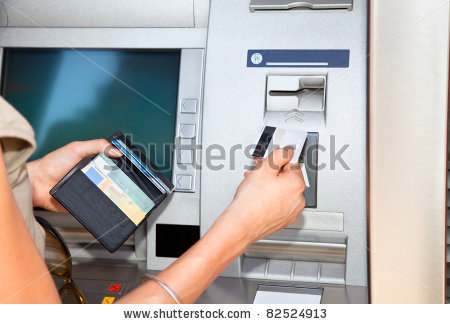If you find yourself running short of cash or having to deal with an unexpected expense, it’s often tempting to slip your credit card into the nearest ATM and take out what you need. Although making this kind of withdrawal is simplicity itself, you’ll wind up paying a heavy financial penalty as a result. Recent studies show that the vast majority of people who use their credit cards to withdraw cash are unaware of just how much it costs and what the long-term implications of borrowing money in this way are. When you make a regular purchase with a credit card, you don’t start paying any interest on the amount until your next statement is issued. This means that if you pay back your the balance in full within that time, you won’t pay any interest at all.

Balance
With a cash withdrawal, however, there is no interest-free period so the charges start building up right away. Even if you plan to pay the balance off in full at the end of the month, you will have to pay all the interested that has accumulated up to that point. In most cases, interest on cash withdrawals is charged at a higher rate than that of other purchases. In addition, most credit card companies also charge a set cash-handling fee each time you make a withdrawal and this is added to your outstanding balance. The costs can be even higher if you decide to use your credit card to withdraw cash while you are out of the country. In addition to the usual cash-advance fee and the higher interest charges, you will also have to pay a foreign-exchange fee.
The biggest problem with making a cash withdrawal on your credit card is the way repayments are allocated, especially when it comes to those card holders who pay just the minimum amount required every month. Credit-card companies generally apply any payment they receive to the lower-interest, purchase portion of a balance and leave the cash-advance portion untouched. Payments are only applied to the cash-advance portion once the remaining balance has reached zero.
Interest
This means that if your credit card has a high balance and you are making only the minimum repayment each month, it could be years before you get round to repaying the cash advance. During that time, interest will continue to be added on. The only way to stop interest accruing in the cash-advance portion of your credit-card balance is to pay the entire amount off in full.
Due to the high costs involved, withdrawing cash on a credit card is something you should only ever do as a last resort. At price comparison websites you’ll find it easy to compare the different products being offered by credit-card companies as well as the fees and interest rates they charge for cash withdrawals. You can also find details of banks, loan companies and other financial institutions where you might be able to arrange an overdraft or short-term loan to cover your cash needs at significantly less cost than you can expect to pay if you withdraw the money using your credit card.
Article written by Andrew Griffiths – Working in financial services for over 10 years, and providing impartial advice and financial content for MoneySupermarket
